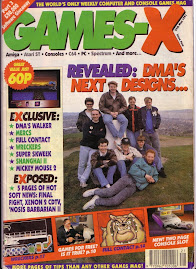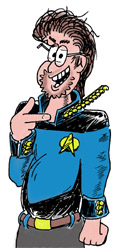Elsewhere, I'm halfway through the first draft of a script which will hopefully become Intrepid's second full-length episode. It's been referred to on the official wiki for some time now, but it's only in the last few months that I've started working on it in earnest. (For various values of 'earnest').
Monday, October 29, 2007
More Rumbly Writings
Elsewhere, I'm halfway through the first draft of a script which will hopefully become Intrepid's second full-length episode. It's been referred to on the official wiki for some time now, but it's only in the last few months that I've started working on it in earnest. (For various values of 'earnest').
Saturday, October 20, 2007
What is Science Fiction Anymore?
Nobody seems to know anymore. A recent poll conducted by the BBC drew much comment on our own forums, because of the twenty or so favourite SF shows (as voted for by the public), it seemed to us that just a little over half of them were actually SF. Admittedly, there seemed to be a sliding scale of 'SF-ness' with the usual suspects of Star Trek and Battlestar Galactica flying the SF colours, then shows with a strong flavouring of SF and then... hold on a second. A sliding scale of SF-ness? If the poll was to be believed, the public – astoundingly - considers Twin Peaks to be Science Fiction!
But is that really so astounding? Up until now, the bane of SF fans was the tendency to lump anything vaguely genre-looking in the same immature-shaped hole labelled 'not literature' or at least 'not worthy'. Librarians and book chains mix Magician and 2001 with a completely straight face. Nowhere does there appear to be a section that isn't headed up by the words “Sci Fi and Fantasy”.
However, the poll has solidified something that I've been gradually becoming aware of. In the magazine SFX, there has been an increasing amount of horror coverage, which to be fair reflects the amount of horror movies newly released and 'SFX' is somewhat of a catch-all for genre fiction anyway. But now there's a rival magazine out there and it had hit the ground running with an equivalently large proportion of the pages devoted to horror. Sci Fi and Fantasy seems to have become Sci Fi, Fantasy and Horror. In some cases without the Fantasy.
Looking for a movie to watch on Virgin Media's on-demand feature, I was presented with a list of categories and it was this that nailed it for me. One of the categories was “Horror and Sci-Fi”. This was interesting all by itself, since within that category I counted thirty eight movies of which an entire four were Sci Fi. Sort of. So few purebred SF titles appeared, that before I'd got halfway through the listing, I was convinced I'd have to include Gremlins which was surely more appropriate as Fantasy. Discounting that, I had three SF titles and one of those was Frankenstein, which we elitists SF types tend to add to the canon because it adds respectability. But if I discount Gremlins, then how can I add Frankenstein which anyone will tell you is (very obviously) a Horror?
The reasoning goes that the Frankenstein novel is often called one of the first examples of true Science Fiction because the power that drives Frankenstein's creature is explicitly derived from science, not magic, in the form of electricity; then new and mysterious but in principle explicable. Primarily, though, any example in cinematic form is going to be labelled a Horror, even if a classic one.
So that left me with two titles from the thirty eight vying to represent our maligned genre. From here it got even more muddled, since the next one in my shortlist was Lord of the Flies. This was even more of a stretch than Frankenstein had been, but as I recalled it from reading it in school, the island setting involved a nuclear war having taken place offstage. (I confess that I haven't been able to support that statement, but it is genuinely how I remember it.) Lord of the Flies is a very literary source novel, much favoured of English teachers and so describing it in genre terms could be taken as a crafted insult. SF's rich heritage is rarely recognised and it is this 'worthiness' distinction that leads to quality SF being lauded as long as the SF part is dismissed.
Worthy, as long as we ignore those troublesome SF elements. Battlestar Galactica was noted by the public as being Science Fiction. Indeed with fleets of spacecraft, space battles, searches for a missing planet and artificial lifeforms that mimic humans, how could anyone mistake it for anything else? Because Battlestar Galactica is really high quality, therefore some commentators have declared that it's not really Science Fiction at all, an opinion shared by some members of the cast! The night before Sky One vanished from Virgin cable boxes, the announcer introduced it with “Forget Sci Fi, this is real drama”. Jeanette Winterson recently wrote a novel containing spacecraft fleeing a dying Earth complete with sentient robots and a post-apocalyptic city.. Jeanette Winterson also hates Science Fiction. She said so in an interview with New Scientist.
Really, I shouldn't have had too many hopes for the movie category which now had a shortlist contained a single item. One film left which was reputedly SF and that was Village of the Damned, based on a novel The Midwich Cuckoos, which actually is truly, authentically Science Fiction. Well, mostly. Primarily it was a still a horror, just like Frankenstein. So the number of possible movie choices I had in that category numbered exactly nothing. I found this slightly bewildering, since the complete A-Z section had Armageddon which I thought (dreadful, brain-dead mess though it may be) would have been an obvious choice as SF. Only, it was Action Adventure. Then there was Deja Vu which has as solid an SF premise as you could ever hope to find, looking back into the past through a wormhole. It was a Sci Fi Thriller, but clearly a thriller with a veneer of SF. Thriller first, anything else second.
So why does no-one seem to know what Science Fiction is anymore?
Did they ever?
I suspect that SF has become less a genre in its own right, than a kind of flavouring for other genres, since SF as a standalone type of story is notoriously hard to quantify. Damon Knight defines it thusly: “science fiction is what we point to when we say it”, whilst Norman Spinrad tells us: “science fiction is anything published as science fiction”. Frederik Pohl is quite explicit: “Science Fiction is what science fiction fans mean when they point to something and say 'That's Science Fiction'”. Can I be correct, then, if I assert the opposite? What if I point to something and say “That isn't science fiction”? Part of the dilemma, I think, is that traditionally distinct Sci Fi elements such as robots, ray guns, rockets and computers are now so much part of mainstream drama, indeed part of real life, that we fail to recognise them as such anymore.
I'm thinking of TV shows like Alias, Spooks and other hi-tech spy thrillers whose plots can revolve around some gimmick or gadget that would have deserved a short story all to itself in the 50s and been hailed as visionary. How often does nanotechnology crop up in these shows? It has reached the status of a tired cliché, if somewhat more advanced in fiction than we've seen in the labs so far. I first encountered the concept of nanotech in an old issue of the role playing magazine White Dwarf, where it described microscopic robots injected into the bloodstream to repair damaged cells. It was dated 1973. Reading New Scientist, such uses now seem merely a matter of waiting until they're ready. Does nanotech even count as SF anymore?
What about computer viruses? Even more than nanotech, they have become solidly embedded in the mainstream. Indeed, computer viruses in drama have become nothing more than a lazy plot device, whose implications are never worked out. Why would I even consider it to be a SF device? It depends where you happen to be in time. The concept of a computer virus was reputedly invented by John Brunner in his 70s novel Shockway Rider, which was an astonishingly prophetic vision of the future. Yet as I was writing this, a computer security firm has stated that there are so many real viruses out in the wild that they've stopped counting them. When did they stop? At a quarter of a million. Yesterday's futuristic SF element has become something that, if you're reading this, you are not unlikely to be sitting within a few feet of one.
The future is become out of date more quickly than ever! The US Army has a working pain ray, we've had rockets for decades and a robot probably built your car. William Gibson – father of Cyberpunk – has even given up trying to predict the future because it's become so difficult. So how can we say what is genuinely Science Fiction when those classically SF trappings are used merely as window-dressing on big-budget-billed-as-SF movies and those trappings are becoming indistinguishable from the world you see outside the window? What does it mean that a writer can create a short story where the big revelatory point is that – shock! - satellite TV can be used to broadcast violence and porn and is an excellent propaganda tool because of it? That's the box I've had in the corner of my living room for a decade. Yet Arthur C Clarke's short story I Remember Babylon was published in 1960. Can we still call it SF? Did it become mainstream by some literary equivalent of radioactive decay?
I didn't know what my conclusion would be when I started to write this. But my take is that anything with overt SF trappings, flavouring, colouring or a veneer of those old-fashioned futures which may or may not take place, has become somewhat muddled with the real world. Technology proceeds at great speed, the understanding in the street is that science and technology between them are capable of anything at all. Even if it's something unlikely, it probably just means (they reckon) that it hasn't escaped from a super-secret government laboratory yet. So it's just another plot device to dump seamlessly into the middle of a TV drama.
And true SF? Or what, with a hint of smugness, I will claim to be the genuine, hard-core stuff that really makes you think? True SF would take that gimmick, that gadget and really work out the consequences of it. In the novel, The Trigger, a device is invented which can throw up a field in which explosives can no longer explode. If that was Alias, then it would either be stolen or destroyed by the end of the episode. The world moves on and so what. The novel, in contrast, explores what such a capability would do to society and it ain't pretty, despite what you might first assume.
My contention, then, is that a properly SF work of fiction doesn't leave the world the way it found it. The world is, effectively, not our world although it starts off the same. And in the true spirit to the quotes earlier, there is plenty of Science Fiction which bears no resemblance to what I just said! In the end, I forgot about trying to watch a movie and instead watched a topical comedy news quiz, Mock the Week.
They were joking about cities rising up on giant robot legs.
Mainstream indeed.


